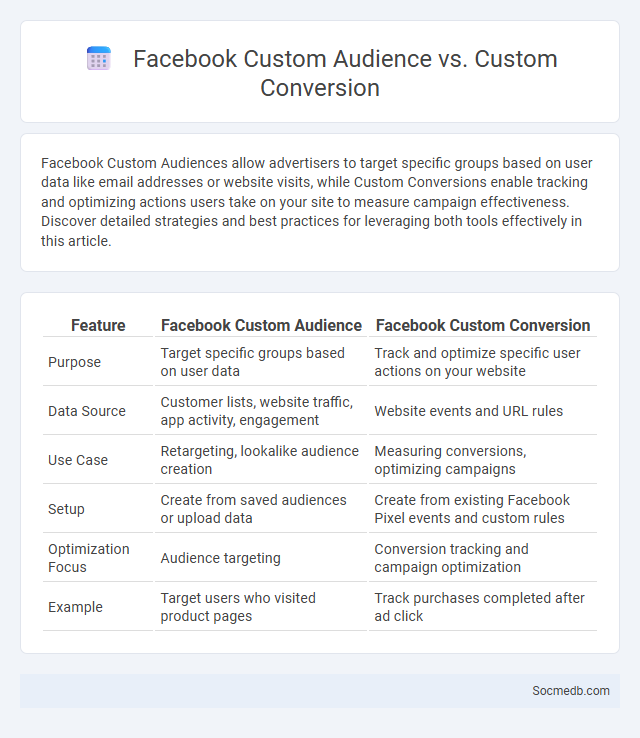
Photo illustration: Facebook Custom Audience vs Custom Conversion
Facebook Custom Audiences allow advertisers to target specific groups based on user data like email addresses or website visits, while Custom Conversions enable tracking and optimizing actions users take on your site to measure campaign effectiveness. Discover detailed strategies and best practices for leveraging both tools effectively in this article.
Table of Comparison
| Feature | Facebook Custom Audience | Facebook Custom Conversion |
|---|---|---|
| Purpose | Target specific groups based on user data | Track and optimize specific user actions on your website |
| Data Source | Customer lists, website traffic, app activity, engagement | Website events and URL rules |
| Use Case | Retargeting, lookalike audience creation | Measuring conversions, optimizing campaigns |
| Setup | Create from saved audiences or upload data | Create from existing Facebook Pixel events and custom rules |
| Optimization Focus | Audience targeting | Conversion tracking and campaign optimization |
| Example | Target users who visited product pages | Track purchases completed after ad click |
Understanding Facebook Custom Audiences
Facebook Custom Audiences enable marketers to target specific user segments based on data like email lists, website visitors, or app activity, improving ad relevance and conversion rates. By creating these tailored audiences, businesses can deliver personalized content to users who have already shown interest in their brand, increasing engagement and return on ad spend (ROAS). Utilizing Facebook Pixel and CRM data integration enhances the accuracy and effectiveness of Custom Audiences for highly targeted advertising campaigns.
Exploring Facebook Custom Conversions
Facebook Custom Conversions enable precise tracking of user actions on websites, allowing businesses to tailor ad strategies based on specific customer behaviors. By defining unique conversion events such as purchases, sign-ups, or page views, advertisers can optimize campaigns for higher return on investment (ROI). Leveraging Facebook Pixel alongside Custom Conversions enhances audience targeting and provides detailed insights into ad performance metrics.
Custom Audience vs Custom Conversion: Key Differences
Custom Audience allows you to target specific groups based on user interactions, such as website visits or app activity, enabling precise ad delivery. Custom Conversion focuses on tracking and optimizing specific user actions, like purchases or sign-ups, to measure campaign performance and improve ROI. Understanding these key differences helps you tailor your advertising strategy for maximum engagement and results.
How to Create Facebook Custom Audiences
Creating Facebook Custom Audiences involves uploading customer data such as email addresses, phone numbers, or app activity to Facebook Ads Manager to target specific user groups. Utilizing Facebook Pixel allows you to track website visitors and retarget them based on their behavior, enhancing ad relevance and conversion rates. Leveraging engagement Custom Audiences based on interactions with your Facebook page or posts helps refine campaign targeting and increase ROI.
Setting Up Facebook Custom Conversions
Facebook Custom Conversions enable precise tracking of user actions by creating tailored conversion events based on URL rules or parameters. Setting up custom conversions involves accessing the Facebook Events Manager, defining specific URL rules or parameters that signify key actions like purchases or sign-ups, and assigning relevant event names and values. This approach enhances ad targeting and optimization by measuring the effectiveness of campaigns against business-specific goals.
Benefits of Using Custom Audiences in Facebook Ads
Custom Audiences in Facebook Ads enhance targeting precision by allowing advertisers to reach users who have already engaged with their brand, increasing conversion rates and customer retention. Leveraging data such as email lists, website visitors, and app users enables personalized ad delivery, resulting in higher relevance and improved ROI. This strategy reduces ad spend wastage by focusing on a warm audience more likely to respond positively to marketing efforts.
Advantages of Custom Conversions for Campaign Tracking
Custom conversions enhance social media campaign tracking by enabling precise measurement of user actions tailored to specific business goals. They provide detailed insights into engagement metrics such as purchases, sign-ups, or content interactions, allowing marketers to optimize ad spend effectively. Leveraging custom conversions improves return on investment (ROI) through targeted data analysis and refined audience segmentation.
Best Practices for Leveraging Custom Audiences
Leveraging custom audiences on social media enhances your targeting precision by utilizing existing customer data such as email lists, website visitors, or app users. Effective segmentation and regular audience updates improve engagement rates and ad relevance, ensuring your campaigns resonate with the most interested prospects. You can maximize ROI by combining custom audiences with lookalike audiences to expand reach while maintaining high conversion potential.
Choosing Between Custom Audiences and Custom Conversions
Choosing between Custom Audiences and Custom Conversions depends on campaign goals and user behavior tracking needs. Custom Audiences target specific groups based on website visits, app activity, or customer lists, maximizing ad relevance and engagement. Custom Conversions focus on tracking specific actions like purchases or sign-ups, enabling precise measurement of campaign effectiveness and ROI.
Case Studies: Custom Audience and Conversion Strategies
Case studies reveal that leveraging Custom Audience targeting on platforms like Facebook and Instagram significantly boosts conversion rates by reaching users with personalized ads based on their behavior and demographics. Brands adopting lookalike audiences derived from their top-performing customers experience higher ROI by efficiently expanding their reach to potential buyers with similar profiles. Conversion strategies incorporating A/B testing and pixel tracking optimize ad spend by continuously refining audience segments and tailoring content to increase sales and lead generation.
 socmedb.com
socmedb.com